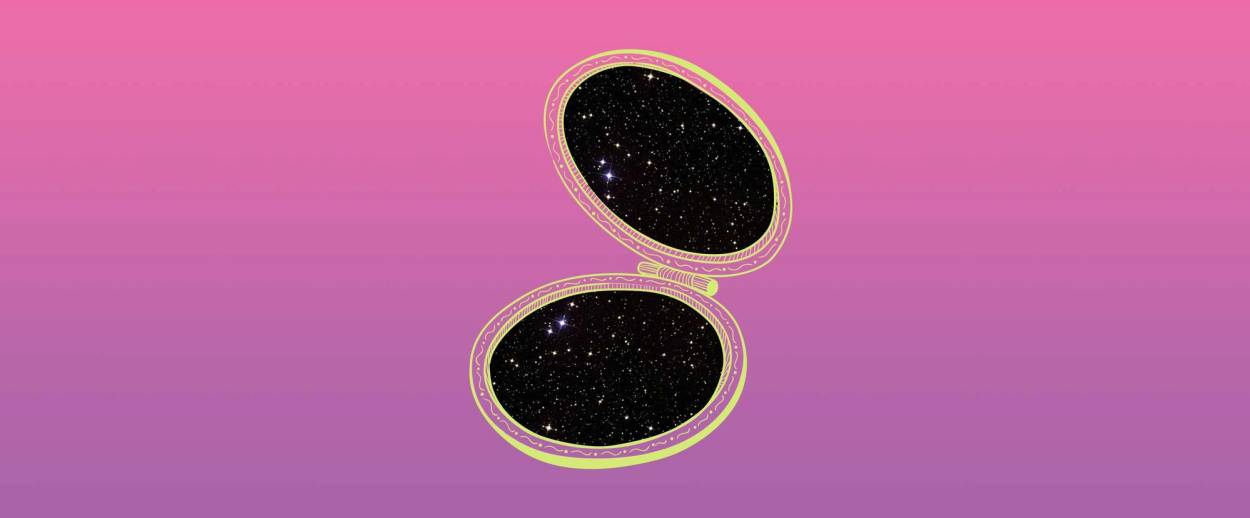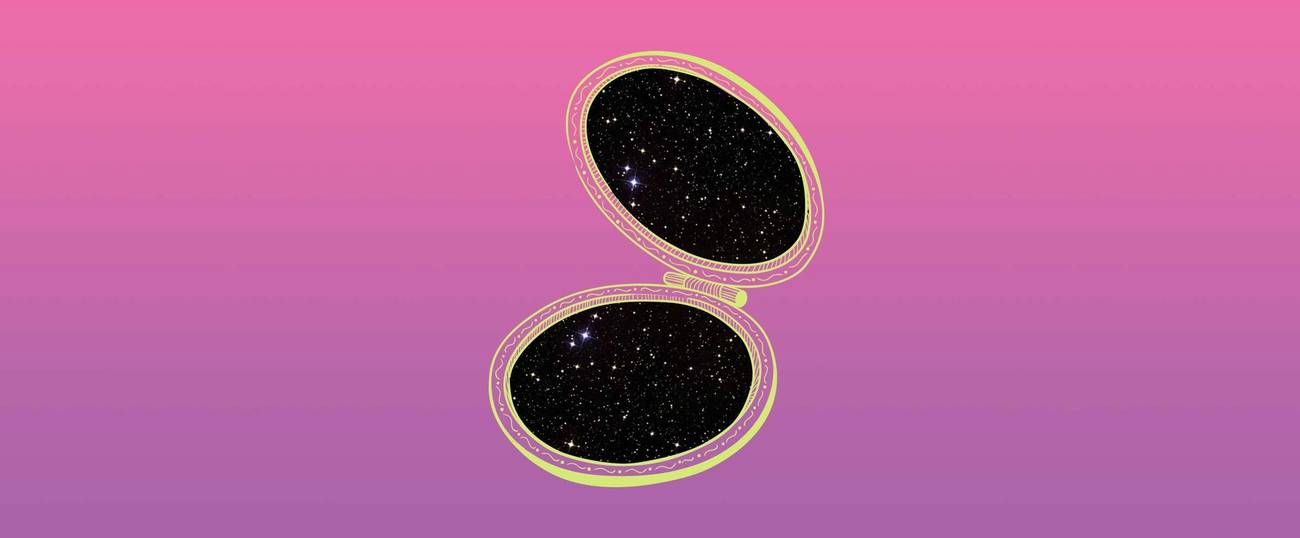Beauty Fades
Lessons my mother taught me about getting older




When I was about 6 years old, when my mother was drying me off after a bath, I asked her if she believed in an afterlife.
It was just after she had told me that her grandparents had died at the hands of the Nazi death squads back in Lublin. Sensing she had frightened me, she hastily added, “It was a long time ago.”
I was not put at ease. “But what happens to them now—where do they go?” I asked. “Where do people go when they die?”
“There’s a place they go to be with God,” she told me. “It’s different than here, different. They are the holy ones. That’s what the rebbes told us.”
It was plainspoken faith—an idea that I took from her simply and grew to accept as my own, but for some reason the question of the afterlife hovered between us and shadowed all the days of our lives together.
*
My mother was a dead ringer for Grace Kelly. There was a luminescence to her look, the look of both a woman and a child, both a rabbi’s daughter and a rabbi’s wife. And yet whenever she received a compliment on her beauty and youthfulness, she couldn’t help but tell me later in private, “I will wake up one morning and it will all be taken away.”
Both her looks and the terror of losing her looks were her constant companions. Was this a vestige of the war years, the blitz in London where her home was razed to the ground, or even earlier in the blitz when she was taken away to the countryside without her mother at the age of 4—at a moment’s notice?
As an adult my mother traveled every Tuesday to New York City to meet her Warsaw-born mother for lunch and a drizzle of shopping afterward. This custom began during the Eisenhower administration and continued straight through the Vietnam, Six-Day, and Yom Kippur wars and ended sometime in the Obama era. After her mother passed on in the late 1970s, this ritual continued, but she would lunch instead with my sisters—and occasionally me.
Sometimes at lunch or at some other get-together my mother and I used to play a game. I would name a famous movie actress—say, Meryl Streep—and I would say, Ma, how old is Meryl Streep? And she would say some impossibly low number like 40, and I would say, Ma, she’s 69! And my mother would say in her soft Yiddish-British accent, “She cahn’t be.”
And then she would begin to calculate: “Let’s see, when Sophie’s Choice came out it was the year of Simcha’s bar mitzvah …” and she’d recall her own age at that event, and after doing the math, finally she would sigh and say, well, there it is, I suppose you’re right, and then quickly she would add, “she certainly doesn’t look it.”
When it came to her aging and death (or mine), my mother and I would both conspire to change the topic as though getting older were a personal failing—an embarrassment; even discussing it should be avoided at any cost. To break off such a discussion quickly, one of us might ask who was coming over for Shabbes. In this way, any talk of death would dissipate into the atmosphere, like the faint, light smoke from Sabbath candles.
Yet, what she did not know was that I moved in this terror of loss and death with her. If she would no longer be youthful and beautiful one day, what would she be, who would she be? This terror of decay was the background music for all our talks and get-togethers.
At one point during our lunch the winter sun threw a square of light on her neck and I saw peach fuzz like I remember seeing on my grandmother—her mother. Anxiety and alarm shot through me. Peach fuzz was too real, too of this earth, but then she moved or the sun shifted, and her particular incandescence was restored.
Bathed in the winter light she seemed to me a bit like a current Catherine Deneuve. Such was the way her shaytel was styled with a soft wave in the front, her satiny cheeks full of enchantment. Perhaps beauty could suffice, I mused, and we could all live forever.
A memory came to me then, how my mother sat quietly, photogenically, her head tilted with deference and respect when her father or husband or other male relative spoke at my bar mitzvah or other public occasions. She had no inclination for the weightier Torah subjects, but she took great pride in them. Such a desire to be quietly luminescent in the idealized way of the matriarchs, Sarah, Rebecca, Rachel, and Leah, left little room for a search for the truth that gives people definition or even a search for the self, which can give force to a personal philosophy. With the little she was given, she heroically advanced an aesthetic, an ideal of virtuous, modest beauty, but it lacked the weight of a developed self—something for which her circumstances would never have allowed. I began over time to understand her predicament, though. My mother was committed to shine and yet somehow, as rabbi’s daughter and later wife—to be invisible, too.
*
Still, it is natural that a son looks to his mother for strength, even heroism—a glimpse of a way forward, a wise life that is mindful of death. And she did not disappoint.
Her end of days came early; she wasn’t even 70 when it began. First one cancer, then another, then a third—glioblastoma, a death sentence at any age. When she had learned of the certainty of her fate, she let out one deep, powerful scream from the inside that I shall never in all my days forget.
In her final hours, she wept to me: “I caught a look at myself in the mirror.” She looked like a woman with brain cancer—she had lost most of her hair. “Who will love me now?”
I held her hand and was tempted to join her in the usual treist verter, soothing words about her intrinsic beauty (you are still beautiful!) or the afterlife, but I felt an anger well up in me. Would our life be spent mourning beauty? I, too, had often conflated beauty with life. It prevented me from relating to people, women especially. At times I couldn’t or wouldn’t actually see and feel people. I could only see their physical beauty and youth—or lack of it.
I had to say something new. From where I came to say this, I don’t know. Maybe it was the strength of my powerful love for her. “You know what, Ma? It’s time for us—both of us—to grow up.” To my surprise she looked at me and she smiled and said. “You are right. I really have to grow up. And I will.” She slipped in and out of a coma and in three day’s time she died.
*
I am now the age that my mother was then at the time of our lunches—my 50s. The shadows are shorter now in midlife and I am thinking about the next world. I can already smell the way in which I, too, must go.
I think of my mother’s words: “There’s a place we go to be with God.” But when I think about the next world, I find myself thinking about this world and how attached I am to it, how unfinished I am with life and how I pray it is not yet finished with me.
I always imagined myself becoming more devout as death comes near, hastening to prepare my soul to return to the source. I am still at work on a life that I can take with me proudly into death and a life that my heirs and those I influence can take into their lives—a life that is not merely a ticket to an afterlife out of piety or honest virtue, but also successful and rich with experience. I still have those ordinary “needs” to be great and famous, to make a lot of money, to learn how to fly a plane. In other words, I am not entirely sure I want to go to be with God in the next life, but prefer, if I had my druthers, to have God go with me in this life.
But of course, that is a fantasy. That is not the way the world works. We have an expiration date sooner or later. If I were called today, how would I view my life?
I remember my grandparents when they were slightly older than I am now—shpitz Polish Jews eating rice pudding with a coffee and Sweet‘N Low at the kitchen table. It seemed that we had all the time in the world to be young and they had all the time in the world to be old. We had school and they had events to attend, seforim to be studied, morals to be preached, relatives to be reached and rescued. They could have no idea of the ways in which they influenced us, the mark they left on us.
When the Nazis came to Lublin, my grandfather traveled to Geneva with big money to bribe a Gestapo chief to rescue his parents, the Trisker Rebbe and rebbetzin. My grandfather’s parents wrote back to their son in London: “What is the captain’s duty when his ship capsizes? Should he desert the boat? I live in the midst of my people, and I cannot desert them.” The 66-year-old Rav Twersky—my great-grandfather—was martyred in 1942 together with his wife and daughter in a pit near Majdanek.
A decade or two later, their son—my grandfather—and his wife would take us for pizza and ice cream sandwiches and to Rockaways’ Playland. Fresh from Warsaw, Bubbe could speak little English, but she took us to see Fantasia. In the half-light, half-shadow of the movie theater, I could see the reflections of the cartoon characters on her forehead. I can still see them now.
My grandparents, and now even my parents, were relics of another world. In their lifetime through their physicality, their language, their contradictions, even through their aging and their deaths, they rained down sparks that ignited my mind. Somehow, improbably, through a curious mix of tradition and idiosyncratic personalities, they laid down in me a bridge between the living and the dead.
***
Like this article? Sign up for our Daily Digest to get Tablet magazine’s new content in your inbox each morning.
Alter Yisrael Shimon Feuerman, a psychotherapist in New Jersey, is director of The New Center for Advanced Psychotherapy Studies. He is also author of the Yiddish novel Yankel and Leah.